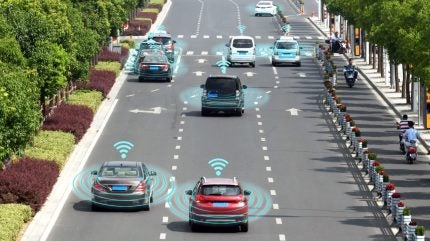
The proliferation of internet connectivity and deployment of 5G cellular technology in major countries such as China, India, South Korea, and Japan are expected to drive the demand for new connectivity features in cars in the Asia-Pacific (APAC) region.
As a result, the APAC connected vehicle technologies market is projected to grow at a compound annual growth rate (CAGR) of more than 4% during 2023-2028, forecast GlobalData, the data and analytics company.

Discover B2B Marketing That Performs
Combine business intelligence and editorial excellence to reach engaged professionals across 36 leading media platforms.
Its latest report, Global Sector Overview & Forecast: Connected Vehicle Technologies – March 2024 reveals APAC held a significant share of the global automotive connected technologies market in 2023, with Asian countries leading in the adoption of OE smartphone and embedded connectivity units. The C.
Gorantala Sravan Kumar, associate project manager, Automotive at GlobalData, said: “Consumers, especially younger generations, are hooked onto their smartphones and gadgets and want to be connected all the time. Their reliance on the Internet and gadgets also seeped into their vehicles and want to stay connected even on the road.”
Concurrently, advancements in technology are being utilised to enhance passenger safety and boost the vehicles’ security features. Many startups have developed specialised chipsets that enable fast communication via 5G and decentralised networks.
Kumar added: “This makes it possible for vehicles to utilise nearly real-time information to improve performance and safety. Automakers are actively looking at these developments and collaborating with such startups or developing in-house technologies to incorporate such features in their offerings.”
The middle and affluent classes are growing rapidly across various Asian countries, leading to an increased demand for smart and connected vehicles.
Kumar: “Consumers are now seeking features such as in-car infotainment, connected services, and advanced driving assistance systems (ADAS), which have accelerated the development of connected vehicle technologies. Asia-Pacific nations have made significant investments in upgrading their digital infrastructure, including the deployment of 5G networks. These high-speed networks are crucial in providing reliable and fast communication between vehicles and the surrounding infrastructure.”
Developing nations are building new urban areas to accommodate their growing populations. To make transport networks and traffic management more efficient, many of these innovative metropolitan areas are being developed as “smart cities” that integrate connected technology across various levels of infrastructure.”
Kumar: “As cars become more advanced, consumers are quickly coming to expect seamless connectivity while driving. This means that automakers and suppliers must keep up with the demand for cutting-edge technology to offer a smooth user experience. This is becoming increasingly important to attract younger consumers, who have grown up with networking technology and are more likely to embrace it. To ensure seamless connectivity, most customers now expect their cars to come equipped with features such as MirrorLink, Android Auto, or Apple CarPlay. These smartphone integration platforms are crucial enablers of connected car technology.”






